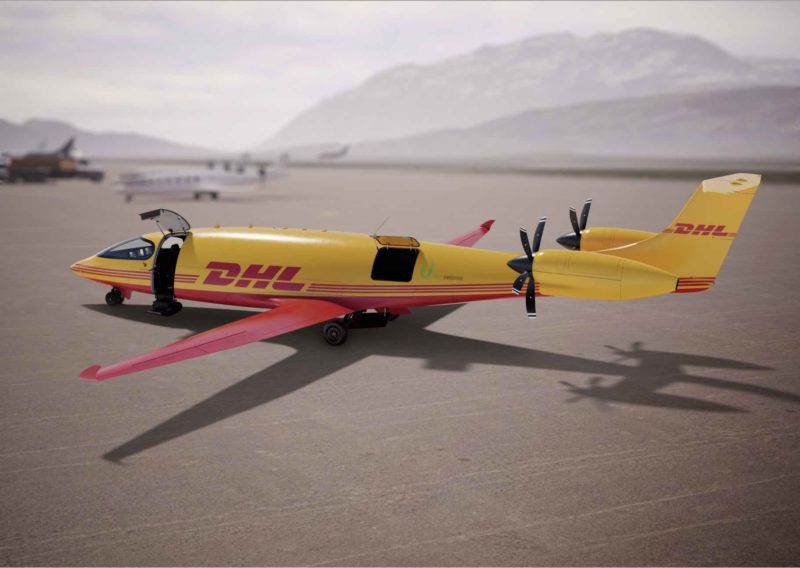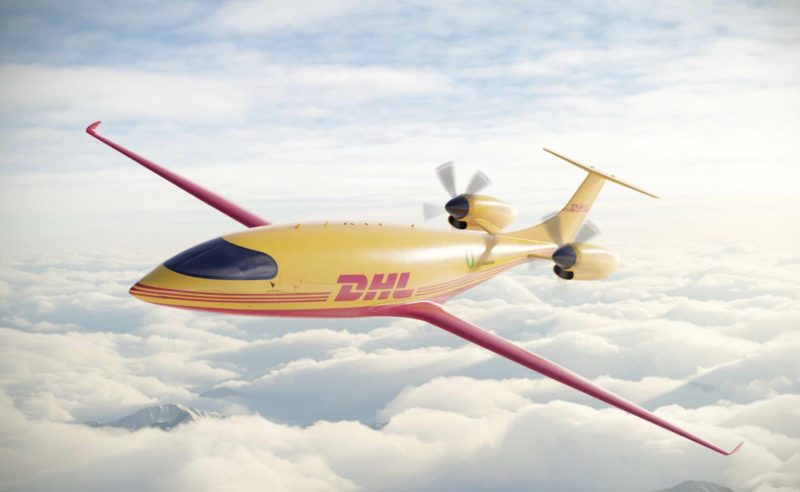DHL Express, the German-based international courier, has become the first company to order 12 all-electric Alice eCargo planes from the Seattle-based electric aircraft manufacturer Eviation.
Until now, Eviation’s Alice electric aircraft has been billed as a 9-passenger, 2-crew commuter plane – able to reach a max cruise speed of 220-knots with a maximum range of 440-nautical miles, or around 815-kilometres.
This week’s announcement by Eviation and DHL Express, however, opens up a new avenue through which the company will be able to sell its all-electric aircraft.
The order to supply 12 fully electric Alice eCargo planes is the first step in DHL’s sustainability plans – which include the long-term goal of reducing all logistics-related emissions to zero by 2050.
Moreover, DHL announced a new Sustainability roadmap earlier this year, in which they promised to invest €7 billion by 2030 in measures to reduce its CO2 emissions – focusing on electrification of last-mile delivery, sustainable aviation fuels, and climate-neutral buildings.
DHL’s new Eviation Alice eCargo aircraft – which are expected to be delivered in 2024 – will be able to carry cargo of 2,600 lbs (1,250 kilograms) and require only 30 minutes or less to charge per flight hour.
The Alice aircraft will operate in all environments currently served by DHL’s existing aircraft, but with its advanced electric motors and fewer moving parts, will boast increased reliability and reduced maintenance costs.
“We firmly believe in a future with zero-emission logistics,” said John Pearson, CEO of DHL Express. “Therefore, our investments always follow the objective of improving our carbon footprint.
“On our way to clean logistics operations, the electrification of every transport mode plays a crucial role and will significantly contribute to our overall sustainability goal of zero emissions.”
DHL believe that the Alice eCargo aircraft are perfect for feeder routes due in large part because they require less investment in station infrastructure.
For example, charging can take place while loading and unloading, ensuring quick turnarounds. DHL will therefore move to build several zero-emission Alice feeder networks across the United States, most likely starting in California.

“With Alice’s range and capacity, this is a fantastic sustainable solution for our global network and will be targeted for operations in the southeast and west coast of the United States,” said Travis Cobb, head of global network operations and aviation for DHL Express.
“Our aspiration is to make a substantial contribution in reducing our carbon footprint, and these advancements in fleet and technology will go a long way in achieving further carbon reductions. For us and our customers, this is a very important step in our decarbonization journey and a step forward for the aviation industry as a whole.”
Eviation unveiled the production design of its Alice aircraft in July, ahead of expected first flight to be held later this year.
Powered by two magni650 electric prolusion units from magniX – another Washington State-based aviation, but one which was originally founded on the Gold Coast – Alice produces no carbon emissions while in flight and significantly reduces both noise as well as cost – which are a fraction of what current aircraft cost per flight hour.
Joshua S. Hill is a Melbourne-based journalist who has been writing about climate change, clean technology, and electric vehicles for over 15 years. He has been reporting on electric vehicles and clean technologies for Renew Economy and The Driven since 2012. His preferred mode of transport is his feet.

